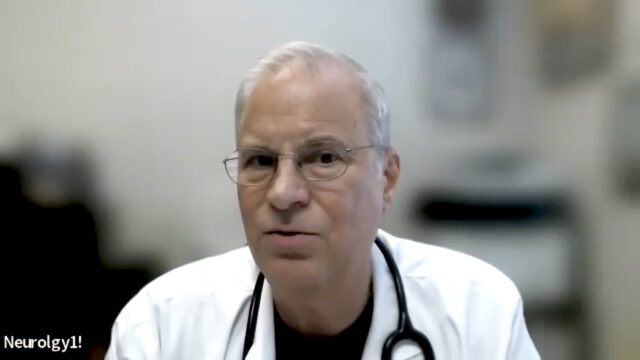Welcome back everyone to Answers for Elder’s Radio Network. And we’re talking about Alzheimer’s disease in this segment of number three of five. And we’re going to be talking a little bit about testing with Dr Paul Winner, and he is the Senior Director of the Premier Research Institute and the director of the Memory Disorder Center in West Palm Beach, Florida. And Dr Winner, we’ve been talking about how Alzheimer’s comes on. I’m learning so much I can’t even believe it. I thought I knew a lot about Alzheimer’s disease. So thank you for being with us.
– It’s my pleasure. Thank you for having me.
– I have a question for you. We do a lot of support with family caregivers. Mom may be fine, but they you start seeing Dad have a little bit of tracking issues. Obviously we want to get people tested as soon as possible. And I can only imagine there’s a listening wondering how in the world do I even approach this subject with Dad? What do I need to do to get everybody on the same page? And everyone’s an individual, but there’s there’s some promise and some hope that I’m really hearing in what you have to say, and so I’d love to have you address kind of broad brush — I don’t mean for you to get into details — how do people start the process?
– Well, I think you want to let people know that we have very good diagnostic methods today. We can actually determine what it is. It could be something simple. So you need to go to a center, essentially a memory disorder center. If you really have a problem, as you’re discussing, the person has a memory disorder issue, there is something already present. It’s essentially now affecting the family. That’s no longer, “I’m worried if I have a little bit of an issue with my memory,” this is affecting the family, that you have to go to a memory disorder center. Most general doctors are not up to speed yet, they’re starting to. In fact, I gave a lecture last night to essentially address this to primary care physicians in our area of what is about to take place. So we all have to get better testing in the area. They need to get to a place that can do 1) a very, very good history and 2) a very good physical exam, and they’re looking at domains of how the brain works. A good history can determine how long it’s been that there’s been memory issues. What was the initial problem? Was it a short term memory issue, was it an immediate memory issue, was it a behavior issue? Was it a movement problem? What is it? Because there’s all different kinds of dementias, or maybe it’s something else. A medication got changed a year ago and that’s when this all started. So there are some simpler problems. There’s thyroid conditions in the family and their medicine got changed. There’s a lot of different variables. So a very good history, a very good physical exam. You need to do laboratory studies, basic laboratory studies, to make sure there is not a problem with thyroid. There isn’t a B12 deficiency. There isn’t an autoimmune or infectious process. This is not expensive and not hard to do.
The next is a nerve behavioral test. You need proper testing on what is going on with the brain. Is the aspect that’s wrong? Is it memory? Is an executive function? Is it processing speed? All the different aspects, attention problems, is there a non-functional area or multiple areas? This gives you a clue right away of what you’re dealing with. It also something let’s say the MMSE, Mini Mental Status Examination, or the MOCHA, right away we get a number that’s generated and we know whether we’re dealing with something in a very early stage, such as maybe mild cognitive impairment. What we’re dealing with a slight earlier Alzheimer’s, or an earlier dementia or moderate dementia. That guides us as well.
The next phase is you need a picture of the brain. You need to make sure there’s not another explanation, so you have to look, or maybe they have a mix. We’ve talked about this a little before. There could be two dementias. The Alzheimer’s type, where you have atrophy in the temporal lobe, a specific lobe of the brain, the little parietal, or you have problems with white matter changes, essentially vascular dementia, and that’s a mild, moderate, severe — we grade that, so we’re able to put that together. Sometimes it’s a glioblastoma, it’s a brain tumor that caused this. Sometimes it’s a meningioma with edema and that’s really easy. We can treat that. That’s a treatable problem, and they’re all better pretty quickly. Sometimes the lab studies, they’re better.
Then let’s say we go through that and it’s suggestive that we’re dealing with clinically Alzheimer’s dementia. Well, that is the clinical aspect, and you can make a clinical diagnosis, but you’re not going to be right a lot of the times. You need to go to the next level.
The next level is bio markers, and there are several now. We have serum bio markers, but essentially the gold study, that the most important study, we should do is to use a PET scan, an amyloid PET scan, and/or add to that a tau pet scan, and there’s two proteins that are involved in Alzheimer’s that’s amyloid and tau, so we can tell whether they’re present. But amyloid is the simpler one, the more basic one. If you do not have amyloid deposits in the brain of a significance, you do not have Alzheimer’s disease, period. it’s something else, but it’s not Alzheimer’s. But that test is expensive. It’s $5, $6, $7,000, and it’s not covered by insurance right now. This is why the bio markers, the serum bio markers which we use in research all the time now, are going to be very, very important as they start to be used by primary care doctors, and now there’s they’ll be able to use the behavioral tests, the bio markers, because they can be very efficient as well. They’re not available that much. They’re kind of expensive. And we have something called phosphoralated tau and we have three of them, 181, 217, 231. Right now, this seems all foreign, but in a few years, this will be very common to everyone. We don’t know which is the best and the cheapest just right now, probably gonna be to 217 or 231. So primary care doctors, initial assessments part of your vow as people, you know a little older.
Why is it so important to do this? We need to know the diagnosis. We must get it correct, because certain medicines we’re developing are being developed for Alzheimer’s. Others are being developed for general dementias, others for Parkinson’s. Others may work at all of these different dementias. We need to know what the person has, so we can select the right medicine as we move forward. There’s not going to be a single solution, not right away. Future, genetic modifications, maybe, but right now in the near future, like next year, we’re going to have medicines. But you don’t give someone a moniclonal antibody to remove amyloid if they don’t have amyloid in the brain. It doesn’t makes any sense. We have to get the diagnosis correct. We have to know what they call the biomarkers, and it’s a neurobiological disease. So there’s neuro-clinical disease, one way are diagnostic issues, and the neurobiological disease are biomarkers, of which the PET scan is the gold standard.
– You know, it’s interesting because I go back to my caregiving years with my mom, who had vascular dementia. She was still the mother, I was still the daughter. I did not have any authority with her, right? But one thing I did learn in this process, and I think it’s important to bring this up because there’s a lot of families out there listening. I learned to write a note to the doctor, put it in a little white envelope when we checked in so the doctor knew exactly what was going on. And that was my little help, and I didn’t have to bring up things that might cause her embarrassment in her head. And I think that’s one of the things that I want to talk about is that families, you become this amazing team member. They can be amazing team member and certainly study partners. They may say, oh, Dad’s fine, it’s no big deal. But getting those tests are so vitally important. Understanding what’s really happening in their everyday life, that has to be equally important, is it not?
– Absolutely. You bring up some very important points, and that’s the caregiver. Some caregivers find it very easy to handle the situation, especially there are different ways people will mature through this illness, and some people don’t experience the paranoias, they don’t experience the behavioral issues there. Again, there are different types of dimensions with that, so they have an easier course of it. But either way, no matter what, easier or more difficult, the caregivers suffers. It’s a lot of stress on the caregiver. They’re watching their loved one, when they’re watching someone they really care about, literally disappear in front of their eyes, they just kind of gray out. Our hope is that we will be able to really significantly slow that process very soon, but the caregivers need support too. I mentioned the Alzheimer’s Association has support for caregivers, and there’s local support as well. We try to do that with our own office. We basically let them know what’s about to happen, so you’re trying to get in front of it a little bit. The most important thing is early diagnosis, and I do believe we will have options very soon to not that this happened in the first place, right, very very slowly, right this minute. But it’s about to take off, I believe, as the clinician who has been doing the research, so that we’ll have a significant plate to choose from — a menu, so to speak, to choose from, of medications depending on where the person is, what the situation is, to slow this disease down. And hopefully we’ll have time to talk about that.
– We absolutely will, because that’s one of my most important mantras, is that I know that there’s hope. This is this is all about hope. There’s so many people, especially here in the Pacific Northwest where we are, we have a very high degree of population with those that suffer from Alzheimer’s disease in the state of Washington. And I don’t necessarily know why that is. They’ve proven it’s not the rain or the gloom or anything like that. I don’t know if it’s the air or whatever we do here, but the idea is that there is hope, there are options. So Dr Winner, how do we reach you?
– The easiest way is just to give me a call, area code (561) 851-9400. That’s (561) 851-9400. or the Premiere Research Institute website at https://premiereresearchinstitute.com/.
– Fabulous, and Dr Winner and I are going to be talking about treatment opportunities in our next segment coming up next.











